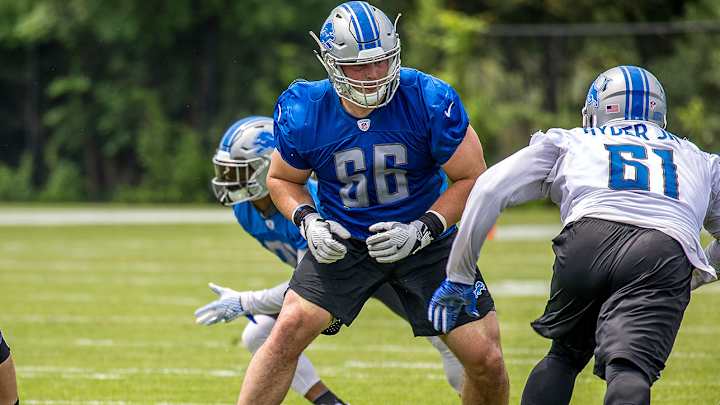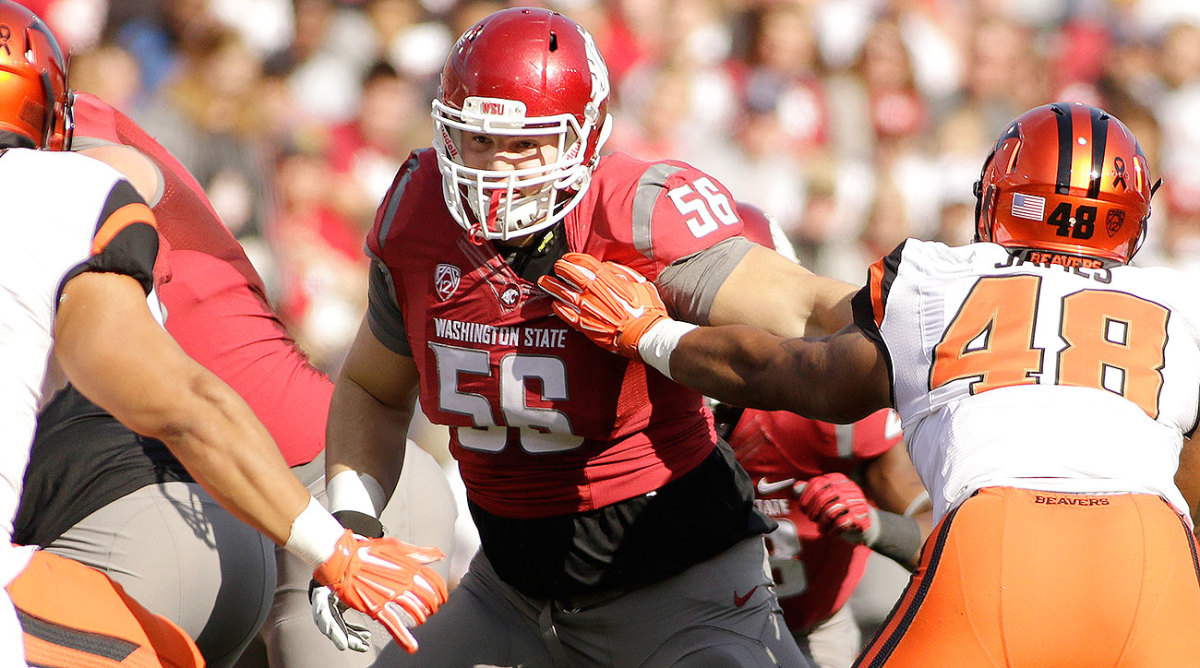Amid Lions' offensive line injuries, Joe Dahl preparing to play wherever he's asked

ALLEN PARK, Mich. — The trouble with the phrase “next man up”—the sports world’s universal rallying cry, used by teams to express confidence in the entirety of their roster—is that for it to be applicable, something has to have gone wrong.
That was the situation as the Lions lined up for 11-on-11 drills Tuesday during the first of three mandatory minicamp practices, with starting left tackle Taylor Decker watching from behind the offense, his right arm in a sling. Next to him stood projected starting guard and high-priced free-agent addition T.J. Lang, also unable to participate due to off-season hip surgery.
Lang, who worked out on a side field with trainers, is expected to join the fray in full during training camp, but the timeline for Decker’s return is less promising. The Lions’ 2016 first-round pick and a 16-game starter a season ago, Decker went under the knife following OTAs, reportedly due to a torn labrum in his shoulder. That injury comes with a four- to six-month recovery time, meaning the search is on to find someone who can hold down Matthew Stafford’s blind side by the start of the regular season.
The options on Tuesday were Joe Dahl (another ’16 draft pick), Cornelius Lucas and ex-Saint Tony Hills, who signed last week. Those options expanded on Thursday when Detroit traded for former Rams top pick Greg Robinson and signed former Bills lineman Cyrus Kouandjio.
Robinson, the No. 2 pick in 2014, is guaranteed his 2017 base salary of $3,322,377, a strong indication the Lions plan to slot him in somewhere along their starting O-line. If he doesn’t win a tackle job, he will be squarely in the mix at guard, along with Dahl, Graham Glasgow (an 11-game starter as a rookie in 2016) and Laken Tomlinson.
The 10 most important players on every NFC North team
Dahl is a wild card at both guard and left tackle. He and Lucas split left-tackle time with the first-team offense Tuesday, with Dahl taking the initial reps. He saw very brief playing time at guard as a rookie, and all indications were that he was going to compete inside again in ’17, until Decker dropped. If he shows promise on the edge, Detroit has a limited window—the remainder of mini-camp, training camp and the preseason—to potentially transition him from backup guard to starting left tackle.
The good news: Dahl has done it before. As a redshirt sophomore (and a walk-on) at Washington State, Dahl started all 12 regular-season games at guard. Then, with just 15 practices allotted to them prior to their bowl game, the Cougars swung Dahl out to left tackle. He started there in the New Mexico Bowl vs. Colorado State, then locked down the position for the next two years.
“He was the best lineman we had that year and the most consistent, we figured we might as well make the move now [before the bowl],” recalls Washington State O-line coach Clay McGuire. “We flip-flopped him and the tackle, Gunnar Eklund, that’s how they finished out their careers.”

Playing up front at Washington State is a unique blocking experience. The Cougars threw the ball more than any team in the country in both 2014 and ’15, Dahl’s two seasons at tackle (738 attempts in ’15; Bowling Green had the next most with 620). They also align their linemen with substantial gaps between them, and their tackles drop straight back on almost every play. It an approach less based on nuance than on consistency and repetition.
“Huge thing was we barely ran any schemes,” Dahl said Tuesday. “We were really simple scheme-wise, we never played in a three-point stance, we hardly ever run blocked. It’s just learning all new schemes and all new techniques, it’s entirely different.”
No matter where he wound up playing as a pro, Dahl faced a steep learning curve. His physical limitations pushed toward a move inside—at 6' 4", 300-ish pounds, and with relatively short 33 1/8" arms, Dahl didn’t check off the boxes of a franchise NFL tackle.
“He’s the most consistent pass blocker we’ve had in this program, probably ever,” says McGuire. “I think he would’ve been a higher draft pick if he had the arm length and height. Everybody labels him as an inside guy and that’s why. His arms aren’t very long, but he has big hands, and he makes up for it with fundamentals and technique. We played him inside his sophomore year, he was really good for us in the run game and pass pro. He was the best kid we had, so put him out there at left tackle. ... He has the ability to play on the edge.”
Jeremy Maclin, a perfect fit for Ravens' offense, could be rare June impact move
The Lions are hoping that’s true, at least in the interim. GM Bob Quinn has spent the past two off-seasons spending significant resources to rebuild the Lions’ line, drafting Decker, Dahl and Glasgow in 2016, then paying up for Lang and right tackle Ricky Wagner in March.
The injury to Decker stumped the momentum. For all the clichéd talk—“It is unfortunate what happened, but you just have to have that next man up mentality,” said center Travis Swanson—losing Decker into October or November could disrupt the Lions’ entire season. They face a daunting start to their schedule, littered with standout pass rushers off the edge: the Cardinals, Giants, Falcons, Vikings, Panthers and Saints, before a bye.
They can ill-afford to be piecing things together at left tackle.
“[Dahl’s] coming along,” coach Jim Caldwell said at OTAs. “He’s now getting a chance to play multiple positions, and Joe’s one of those guys that’s smart. He knows, really, every position on the line. He’s played a little center, played a little guard, obviously. He can play a little tackle for us, so I think it’ll benefit him. Lucas will play some of the tackle for us as well in Decker’s absence, so we do have some in-house answers.”
Kouandijo played well in his injury-shortened stint as Buffalo’s starting left tackle, but he made just seven starts in three years.There is minimal starting experience within the remaining group of Dahl, Lucas and Hills. Lucas has six career starts to his name, a couple coming at left tackle during his rookie year of 2014; Hills has started just once in seven NFL seasons; Dahl played all of 20 snaps last season. Corey Robinson (foot) could play into the plans, too, but there is no set date for his return to action.
“Obviously, it’s terrible having a guy go down,” said Dahl of Decker, “but I’m just trying to do whatever I can to help the group. Right now, they’re having me play tackle. I’m trying to do the best I can with it.”
Complicating matters further is that Dahl also could be in the mix to start at guard, opposite Lang. Dahl slid inside for a handful of reps Tuesday, when Lucas took over at tackle. He, Robinson, Glasgow and Laken Tomlinson are the candidates for the guard position left vacant by Larry Warford’s departure via free agency, and Glasgow is still an option at center, which means that multiple interior line spots are still up in the air.
Desmond Trufant trying not to dwell on 'what ifs' as he makes his post-injury comeback
“[Dahl’s] going to be able to play all five positions,” McGuire says. “At some point. I think he’ll play center in the NFL for somebody. Not trying to say he’s [versatile Hall of Fame lineman] Bruce Matthews or anything like that, but you get a guy that can play all five positions, and that’s marketable.
“Is he what you want at left tackle? Probably not based on stature, but he’s a guy who can kick out to left tackle for a few games. That’s very valuable.”
With the 53-man roster limits, teams covet players with that skill set—the competence, physically and mentally, to shift between multiple spots along the line. How one of those players responds when circumstances shove him into a larger role can, at times, help define a season.
The Lions have to stay afloat without Decker in the lineup. Even after Thursday’s moves, it’s likely one of Detroit’s incumbents will be central to that task.
Thus far, Dahl appears to have the slightest of edges.
“Joe’s good enough to play out there, and he’s going to get a chance to play out there and prove that,” McGuire says. “If you’re making a football player, of course you’re going to make a guy who’s bigger, faster, stronger. ... [But] he’s got thousands of reps on tape, and it’s really good tape. He’s comfortable on an island. He won’t be scared to get out there and block.”
